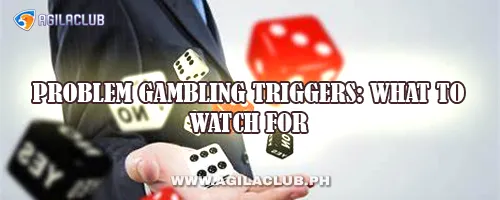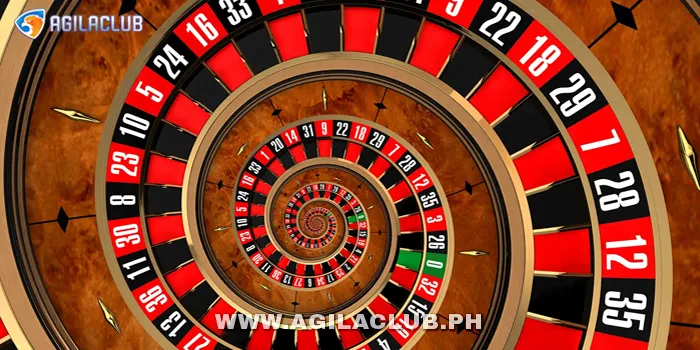
Gambling can be an exciting pastime, but for some, it turns into a serious problem. In the Philippines, recognizing triggers for problem gambling is crucial for prevention and support. Let’s explore what leads to gambling harm, how to recognize these triggers, and the role of organizations like AgilaClub in promoting responsible gambling.
What Are the Common Triggers for Problem Gambling?

Problem gambling can start for various reasons. Here are some key triggers:
- Emotional Stress: Feeling anxious, sad, or stressed can lead individuals to gamble as a way to escape.
- Social Influence: Friends or family members who gamble can encourage others to join.
- Accessibility: Easy access to gambling venues or online platforms increases the risk.
- Advertising: Frequent exposure to gambling ads can normalize the behavior.
- Financial Pressure: Believing that gambling can solve financial problems often leads to excessive betting.
Identifying Triggers for Betting Addiction

Identifying triggers for betting addiction helps in taking proactive steps to prevent problem gambling. Here are ways to identify these triggers:
- Self-Reflection: Ask yourself why you gamble. Is it for fun, stress relief, or something else?
- Monitor Behavior: Keep track of how often and how much you gamble.
- Seek Feedback: Talk to friends or family about your gambling habits.
- Notice Patterns: Pay attention to situations or emotions that lead to gambling.
- Professional Assessment: Consult with a counselor or psychologist to understand underlying issues.
Knowing Factors that Lead to Problem Gaming

Several factors contribute to gambling issues in the Philippines. Understanding these factors that lead to problem gaming can help in addressing them effectively:
- Cultural Acceptance: Gambling is widely accepted in many Filipino communities, making it easier for individuals to develop unhealthy habits.
- Economic Factors: Limited job opportunities may push individuals towards gambling for quick money.
- Mental Health: Conditions like depression or anxiety can increase the likelihood of problem gambling.
- Peer Pressure: The desire to fit in or impress others can lead to excessive gambling.
- Lack of Awareness: Many are unaware of the signs and risks associated with problem gambling.
Recognizing Stimuli for Betting Issues
Certain stimuli can trigger excessive gambling. Recognizing stimuli for betting issues is essential for controlling gambling behavior:
- Bright Lights and Sounds: Casinos and online platforms use stimulating environments to keep players engaged.
- Promotions and Bonuses: Free bets or bonuses can encourage more gambling.
- Winning Streaks: Initial wins may lead to overconfidence and increased betting.
- Competitive Atmosphere: The thrill of competition can drive continuous gambling.
- Easy Access to Credit: Availability of credit can lead to higher bets and deeper financial trouble.
Spotting Triggers for Gambling Problems
Look out for signs that indicate a gambling problem. Spotting triggers for gambling problems early can prevent serious consequences:
- Chasing Losses: Trying to win back lost money leads to more betting.
- Neglecting Responsibilities: Gambling takes priority over work, family, or education.
- Financial Trouble: Accumulating debt or financial instability due to gambling.
- Withdrawal Symptoms: Feeling restless or irritable when not gambling.
- Lying About Gambling: Hiding the extent of gambling activities from others.
How AgilaClub Supports Responsible Gambling
AgilaClub is dedicated to promoting responsible gambling in the Philippines. Here’s how they help:
- Awareness Campaigns: Educating the public about the risks of gambling harm.
- Support Services: Providing resources and assistance for those struggling with gambling, including strategies for effective financial planning.
- Safe Gambling Practices: Encouraging players to set limits and gamble responsibly through initiatives like Responsible Gaming: Advocating for Player Safety.
- Educational Resources: Offering guides and articles on identifying the signs of gambling addiction.
- Community Support: Creating a supportive environment where individuals can share their experiences and seek help.
Tips to Mitigate Gambling Harm
Preventing problem gambling involves several strategies. Here are some effective tips:
- Recognizing Triggers for Problem Gambling: Understand what specifically leads you to gamble excessively.
- Set Limits: Decide on a budget and stick to it.
- Take Breaks: Avoid long gambling sessions to reduce risk.
- Seek Support: Reach out to friends, family, or professionals if you need help.
- Educate Yourself: Learn about the signs and triggers of gambling problems.
- Use Self-Exclusion Tools: Utilize tools and services that help limit your gambling activities.
- Stay Informed: Keep up with the latest information on responsible gambling practices.
Additional Strategies to Manage Gambling Habits
Beyond the basic tips, consider these additional strategies to manage and reduce gambling harm:
- Healthy Lifestyle: Engage in activities that promote physical and mental well-being, such as exercise and hobbies.
- Financial Management: Keep a clear record of your finances to avoid overspending on gambling.
- Mindfulness Practices: Techniques like meditation can help manage stress and reduce the urge to gamble.
- Professional Help: Therapists and counselors can provide personalized strategies to overcome gambling addiction.
- Support Groups: Joining groups like Gamblers Anonymous can offer community support and accountability.
Conclusion
Recognizing triggers for problem gambling is the first step toward preventing gambling harm. By understanding the factors that lead to excessive gambling and seeking support from organizations like AgilaClub, individuals in the Philippines can enjoy gambling responsibly and avoid its negative consequences. Recognizing the signs of gambling addiction and implementing effective strategies can help maintain a healthy balance between enjoying gambling as a leisure activity and preventing it from becoming a detrimental habit.




